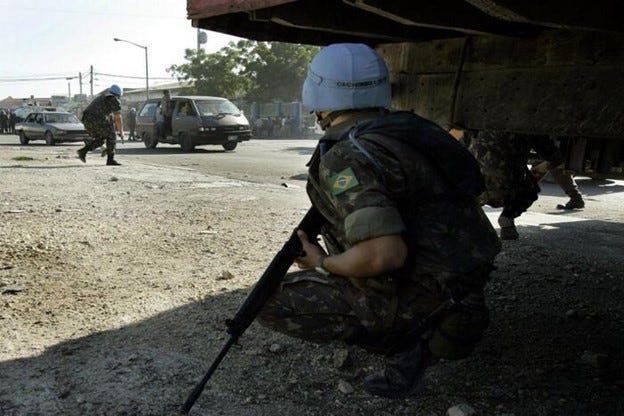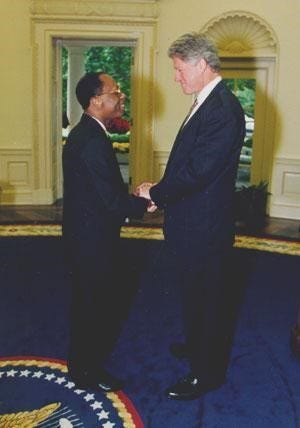On Monday, the 25th of September, the United States and Kenya signed a defense agreement that aims to support a peacekeeping intervention in Haiti. With this crucial step, all that is left in the process of creating this hypothetical peacekeeping force is the approval of the United Nations. This call for the deployment of international forces, and the failure of the Haitian National Police (HNP) to stop the violence has made clear the ugly reality that in many parts of the country, the government of Haiti has no authority whatsoever.
Within the existing power vacuum, gangs have taken the place of the government, the most notable being the G9 Alliance, formerly known as the G9 Family and Allies. The G9, and its leader Jimmy “Barbecue” Chérizier, have gained international prominence for its grip on the capital of Port Au Prince while committing several crimes such as mass murder, arms trafficking, kidnapping, and more. It has become quite a force to be reckoned with, often clashing with HNP and rival gangs to hold on to territory.
A History of Haitian Gang Violence
Though gangs have for some time existed as a major faction in Haitian society, the current situation in Haiti can largely be blamed on political crises that occurred in the 1990s. In 1990 Jean-Bertrand Aristide became the first peacefully elected president following the end of the 29-year-long dictatorial reign of the Duvalier family. He would only hold the position for a year and was ousted and exiled by a military coup in 1991. Even the military did not last long in power; in 1994 the US conducted Operation Uphold Democracy, which removed the military from power and restored Aristide to the office of the president. The remainder of the 90s consisted of a slow transfer of power from occupation forces to the Haitian government until by the turn of the century the occupation came to a close.
The end of the occupation revealed that Aristides’ government amassed an increasingly vocal opposition to his policies, which he had not faced during the transitional period. In response to this increasingly hazardous political situation, the politicians of the time realized that they could make deals with certain gangs throughout the country to ensure they won specific areas in elections. These gangs, called the chimè, evolved to serve a role very similar to the Macoute, violently cracking down on any opposition to Aristides's rule. It was this system of oppression that would come to destroy Artistide’s grip on power.
Facing international backlash to the crimes of the chimè, Aristide cracked down on the very same gangs that had kept him in power. Among these crackdowns, the leader of the gang called the Cannibal Army, Amiot Metayer, was found murdered in September 2003. His brother, Butteur, enraged by the death, renamed and reorganized the Cannibal Army into the Artibonite Resistance Front and began a coup d’etat by seizing the city of Gonaives in 2004. The coup was eventually successful in removing Aristide from power and an interim government, propped up by UN peacekeeping forces, was established. A criminal gang had successfully overthrown a government.

The power vacuum that resulted from the coup created opportunities for gangs, particularly in Port Au Prince, to seize power in their respective territories. With the country increasingly falling under the authority of gang rule, peacekeeping forces designated these gangs as a credible threat to the new government. The UN launched several operations, culminating in a raid in 2007 on the Cité Soleil commune of Port Au Prince. The violence and disruption to daily life caused by these raids led to animosity between average Haitians and UN peacekeepers. The government was and is still currently seen as the weak puppet of a malicious and destabilizing international community.
The Formation of the G9
MINUSTAH ended in 2017 and was replaced by the United Nations Mission for Justice Support in Haiti or MINUJUSTH. It was a smaller mission meant to prepare the Haitian government for the end of a peacekeeping mission in 2019. This meant that instead of facing well-equipped and well-trained Brazilian peacekeepers, the gangs now faced the HNP which was under-equipped and rife with corruption, as well as the poorly trained and poorly funded Haitian military which had only been formed that same year.
In November of 2017 Jimmy Chérizier, a police officer and leader of the gang Delmas 6, rose to prominence when he led an anti-gang operation in the Grand Ravine neighborhood of Port Au Prince. This operation, later to be called a massacre, resulted in numerous civilian casualties at the hands of Chérizier’s men. He faced little to no repercussions.
In 2018, Chérizier became infamous for another massacre, this time in the neighborhood of La Saline, killing at least 71 people. This attack was likely politically motivated since many residents of the neighborhood were actively organizing against then-President Jovenel Moïse and his party, the Haitian Tèt Kale Party (PHTK). Though Chérizier was fired and a warrant was put out for his arrest for his part in organizing the attack, it was the beginning of his alleged work as a political hatchet man for the PHTK. Evading capture, he was able to organize two more politically motivated massacres in the Bel-Air neighborhood in 2019 followed by another gruesome incident in Cité Soleil commune in 2020.
In June 2020, Chérizier announced the formation of the G9 Family and Allies, a coalition of 9 PHTK-affiliated gangs under his leadership which later took the name “G9 Alliance.” In response to the formation of such a powerful alliance, gangs that were affiliated with opposition parties formed the G-PEP alliance. These two incredibly powerful gangs have constantly fought ever since, however, the G9 has consistently been shown to have an advantage over G-PEP. Distinct from their origins in extortion, kidnapping, and arms trading, the gangs of Haiti now carve up territory for political clout and strategic benefit. They are no longer just criminal enterprises, but they now also function as politically aligned militia.

A Family Barbecue
In 2021 President Moïse was assassinated by a group of foreign mercenaries, in a plot that allegedly involved members of G-PEP. Ariel Henry, the Prime Minister and a leader in the opposition movement took power following the attack, prompting serious backlash and protests from the public and the G9 calling on Henry to resign. Moïse had protected the G9 for years and from that point forward they no longer had a friend in the government, they had a new rival.
In September 2022 the G9 captured Varreux terminal, the fuel depot for Port Au Prince. Sky-high prices on gas, school closures, and water services shutting down brought the country to a standstill for months. Chérizier used this as a bargaining chip, first demanding that Henry step down and when that failed, criticizing the ineptitude of the government and HNP as they did not take action for months. A catastrophic amount of gang clashes between G9 and G-PEP-aligned gangs occurred around the period of the blockade, particularly focused on parts of Cité Soleil controlled by G-PEP. According to the UN, at least 263 people were confirmed to be killed in the neighborhood of Brooklyn alone. During this time the president of the Dominican Republic would be quoted as calling the situation in Haiti a “low-intensity civil war.” (Militant Wire previously covered this crisis in an article which you can read here)
In November 2022, the HNP was finally able to dislodge the G9 from the fuel terminal but the impact of such a terrible crisis had destroyed any perception of government forces as effective, something that Chérizier did not fail to mention in a press conference where he again demanded the resignation of Prime Minister Henry. During that same press conference, he also painted himself and the G9 to be the liberators of the Haitian people from the control of a weak government and international meddling.
On March 17, 2023, the Prime Minister of Haiti, Ariel Henry, called on the Haitian military to intervene against increasingly escalating gang violence. This request seems to have not resulted in any meaningful effort to conduct a military-led crackdown.
In the time since, Haiti has descended into even more chaos. Instances of snipers targeting civilians indiscriminately and gangs obstructing humanitarian supplies led to violent vigilante reprisals. The HNP has continuously proven itself to be unable to control the situation and the military which PM Henry called upon is nowhere to be seen. The abysmal response of Haitian forces is what has prompted the US and Kenya to make a decision.
The Future
As the UN has previously called for a “specialized support force”, it is likely that this proposition will pass and an international force will be deployed in an effort to reassert control over the situation. As previously stated, Kenyan forces would be the spearhead of the operation. Potential backing by Jamaica and El Salvador may be crucial as they have offered to commit forces in the past. The track record of these forces, however, has been put under scrutiny as both Kenyan and Salvadorian authorities have been accused of human rights abuses. Chérizier is already positioning himself to take the moral high ground should any abuses occur. Since a peacekeeping force is already unpopular among Haitians he may very well bring people to his side.
General elections are scheduled for some time at the end of 2023 with no set date in place. Elections have repeatedly been postponed since 2019 and even in the political climate of 2023, PM Henry has stated that elections cannot be held during a time of crisis despite previously agreeing to hold elections this year. They will likely be postponed indefinitely so long as the G9 remains a threat and the cancellation of this year's elections is likely to prompt another strategic attack by the G9. This hypothetical attack would potentially focus on blocking humanitarian food supplies to civilians since most of the country is already at an emergency level of acute food insecurity. Securing access to food will therefore be a critical strategic aim for the upcoming peacekeeping mission.
In regards to a potential drawdown of peacekeeping forces in the future, it is unlikely to occur soon after the insertion of troops and would certainly face challenges. In the past, several countries, most notably Canada, have elected to equip the HNP instead of committing troops to the country. This plan, at least for Canada, saw complications and infighting with regional actors such as the Dominican Republic. The HNP has also previously faced logistical procurement issues and rampant corruption, something that will likely present a major challenge to any drawdown effort by the new mission.
Chérizier has threatened to make Port Au Prince a battlefield when and if the intervention occurs. Even after the potential obliteration of the G9, the peacekeeping force will still need to grapple with a humanitarian disaster, gang violence, domestic political infighting, and a populace who is at best skeptical and at worst hostile towards them. The countries that participate in the mission and the international community that backs them are dipping their toes into what could be described as a low-level civil war.





